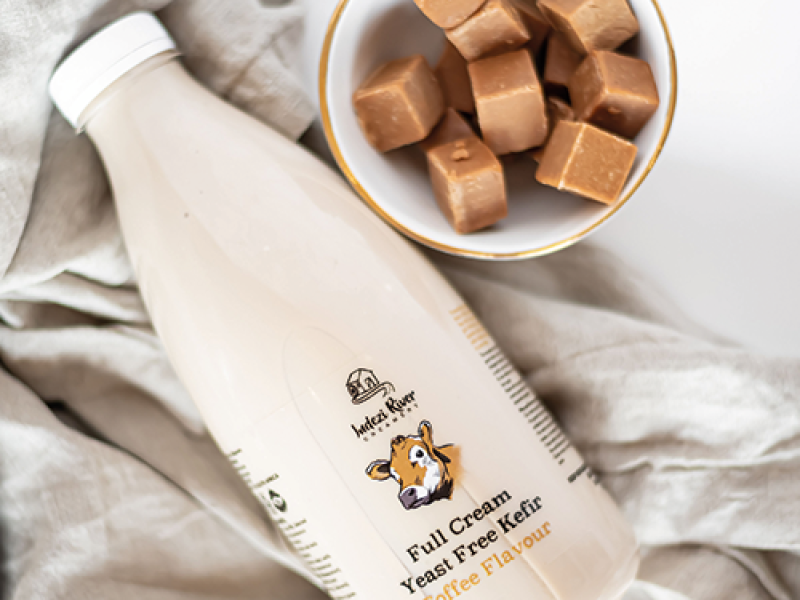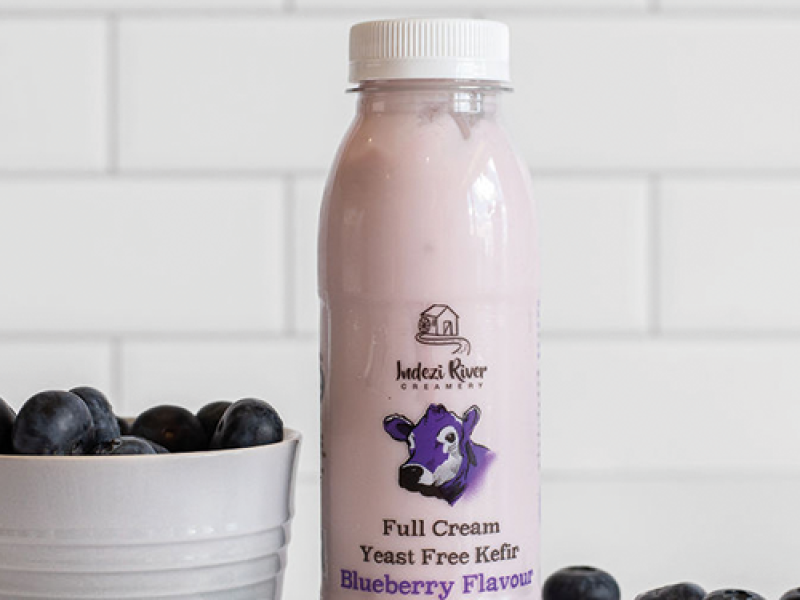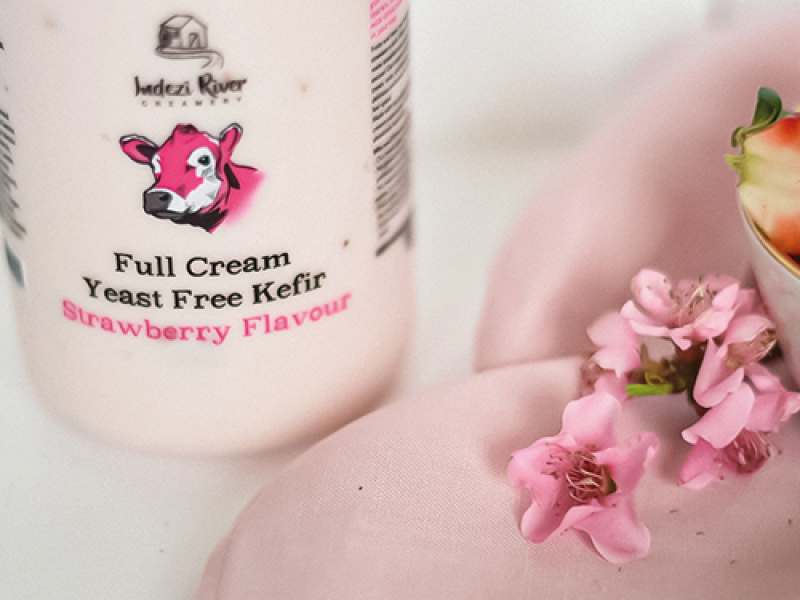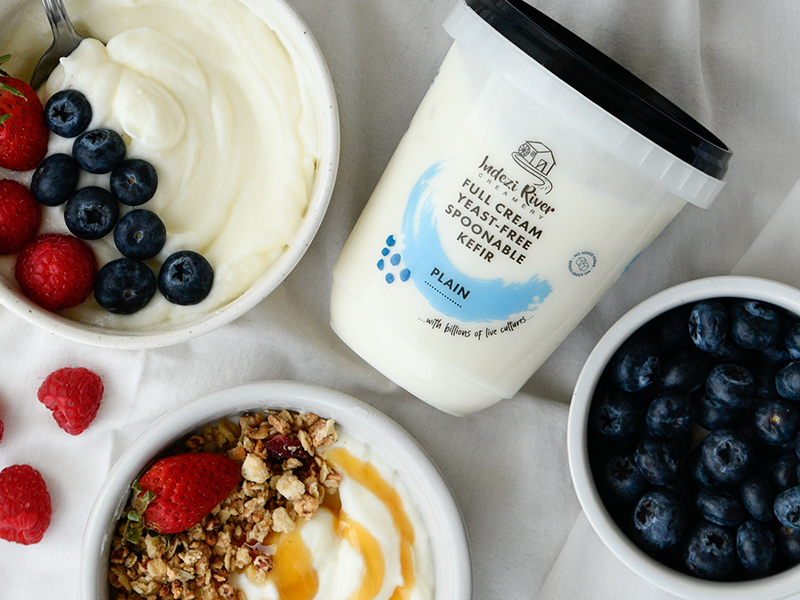
Gut Health
Self-care starts with what you eat. Science is still discovering all the ways that our gut health is related to overall wellness. Kefir is an absolute powerhouse when it comes to supporting your gut health. With our drinkable and spoonable products, there are many ways to add kefir to your day.
Kefir can be used in smoothies, breakfast foods, dressings and dips, puddings and parfaits.




Kefir
‘Kefir’ comes from the Turkish word for ‘good feeling’ and has long been referred to as the ‘elixir of life’. This easy-drinking cultured milk is similar in flavour and texture to a drinking yoghurt. With billions of live cultures in every sip, it has earned its superfood status.
Our plain kefir works beautifully in almost all recipes to improve the nutritive values. We have also created a range of delectably flavoured kefir making it easy to feed to children and those who have a sweet tooth.
Spoonable Kefir
Kefir is a great way to kickstart the day. Our spoonable kefir is an easy, and healthy, addition to breakfast time. Where kefir is similar to drinking yoghurt (with benefits), spoonable kefir is similar to yoghurt (with benefits).
A ridiculously high live culture count of eleven different strains of good bacteria creates a spoonable kefir that is great news for your gut microbiome. As an added bonus, it is great-tasting as well.
You can enjoy it plain, or enjoy the decadent flavours of cosy pear and caramel or indulgent cherry and chocolate. Whichever you choose, your gut will thank you.



The Elixir of Life. Now bottled for you.
Frequently Asked Questions
Recent research has shown that there is a direct correlation between a healthy gut, ideal digestive performance and overall wellness of your body. Our kefir includes live and active strains of good bacteria, clinically selected for having the biggest positive impact on gut health.
Kefir is a superfood that supports general wellness. Our kefir is mild and can be enjoyed as a snack. The more frequently you drink it, the greater the buildup of good bacteria in your gut.
Any way you enjoy it, it is good news for your gut!
Kefir is a nutrient-dense, fermented food made from cow’s milk that has many benefits including promoting good gut-health, maintaining strong bones and addressing gastro-intestinal concerns.
We like to say ‘key-fuh’.
We were inspired by an ancient recipe to create a kefir that fits into your modern lifestyle, adding live cultures to full cream cow’s milk to make a thick and creamy product. To protect the other products in our factory, we use yeast-free cultures. Our kefir has been through rigorous lab testing to ensure that it is overflowing with probiotics that are good for you, your health and your body.
Research shows that a healthy gut (your gastrointestinal system, not your intuition!) is vital for your body’s overall wellness and to manage chronic illness. Probiotics are essential for day-to-day healthy digestive functions.
Our kefir has six different strains of good bacteria, each specifically chosen as they are vital to a healthy gut microbiome. Our spoonable kefir is made slightly differently and has eleven strains of live and active bacteria. Keeping your gut functioning at its best is a priority.
Nutritionally, kefir provides all the benefits of whole dairy, with its health and anti-inflammatory benefits.
Kefir is commonly known as a superfood due to its high levels of protein, calcium and other micronutrients, alongside such a high probiotic count. Dairy is also known to protect probiotics during their travels through our gut. This means that dairy-based kefir is the ultimate weapon for ensuring that the good bacteria get where they need to go.
During the fermentation process, the milk proteins are broken down into essential amino acids and peptides. The protein is now more bio-available, making it easier for your body to absorb.
The live cultures in kefir also ‘eat’ the sugars in milk, turning lactose into simpler sugars. This means that kefir is ideal for those with lactose intolerance, as the cultures have already broken lactose down and made it easier to digest. This process also creates lactic acid which is helpful to your body at a cellular level. Recent research has shown that there is a direct correlation between a healthy gut, ideal digestive performance and overall wellness of your body and mind. The nutritional and bacterial composition of kefir has been clinically shown to alleviate digestive problems, boost immunity, improve bone density, help in the fight against some cancers, relieve allergies and improve skin health.
New research suggests that it can support the management of ADHD and perhaps slow the onset or severity of mental decline in the elderly.
We still have much to learn about this wonder food.
Not all probiotics are created equal. Our drinking kefir includes six strains and our spoonable kefir includes 11 strains of probiotics that have been clinically proven to have the biggest positive impact on gut health. With our cultures, we can ensure optimal and reliable probiotic counts (in the billions) in every bottle.
Our culture has been developed to exclude yeasts, which can pose food safety problems in factories like ours. Some people are also sensitive or allergic to yeasts. They can happily drink our kefir, getting all the health benefits too.
The wonderful thing about our particular culture blend is that it is consistent across every batch of kefir. The different strains of bacteria are optimally balanced to be just right (based on intensive scientific study). You are guaranteed to get the same good stuff in every bottle.
The probiotic count of our kefir is another reason we love it! The probiotic count is measured in colony-forming units (CFUs) of good bacteria. Lab results show our drinking kefir to contain around 1,6 billion CFU per gram when bottled. By the expiry date, it had reduced to 0,9 billion CFU per gram.
This suggests that a 300ml bottle of drinking kefir has about 480 billion CFUs of our special culture mix. Even at the expiry date, there are still 270 billion CFUs in that small bottle!
Spoonable kefir has similar results, with every tub containing billions of good-for-you bacteria.
You will see a culture count on the packaging of our kefir. We report this at its lowest point (rather than at its highest) so that you can be confident of always getting more bang for your buck.
These three dairy products are made similarly but the particular cultures used lead to different results. Kefir has a significantly higher probiotic load than maas and yoghurt. The cultures also work differently in our guts, with kefir having the edge in terms of functionality.
We do not add any preservatives or sugar to our plain kefir. Our flavoured versions make sure that everyone can enjoy kefir, including children. These flavoured options contain only enough unprocessed sugars to get a delicious flavour while avoiding any unhealthy sugar highs.
The probiotics in kefir are designed to survive the tumultuous journey through to our gut, so they are very hardy and can stand up to the ingredients that we use in our flavours. Both plain and flavoured kefir are powerhouses for supporting gut health.
On-going fermentation will cause a natural separation in your kefir as the whey releases from the product. A shake of the bottle will mix the product again.
Kefir is not medicinal. It is a superfood that supports general wellness. Our kefir is mild and can be enjoyed as a snack. The more frequently you drink it, the greater the buildup of good bacteria in your gut, and the better you’ll feel.
You can be assured of the quality of cultures in our kefir, as we source from only the best scientists who really know what they are doing!
There are 6 strains of bacteria in our drinking kefir:
- Streptococcus thermophilus
- Lactococcus lactis ssp. Lactis
- Lactococcus lactis ssp. cremoris
- Lactococcus lactis ssp. lactis biovar diacetylactis
- Leuconostoc
- Bifidobacterium
There are 11 strains of bacteria in our spoonable kefir:
- Streptococcus thermophilus
- Lactococcus lactis ssp. lactis
- Lactococcus lactis ssp. cremoris
- Lactococcus lactis ssp. lactis biovar diacetylactis
- Leuconostoc mesenteroides
- Bifidobacterium lactis
- Lactobacillus acidophilus
- Lactobacillus brevis
- Lactobacillus casei
- Lactobacillus delbrueckii ssp. lactis
- Lactobacillus rhamnosus

